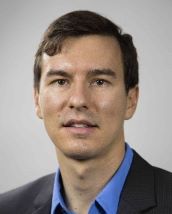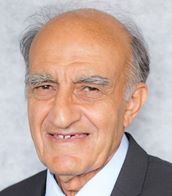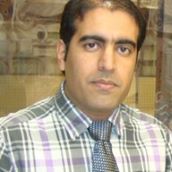Lecturers
Invited Speakers from Industry:

Dr. Egor Dontsov is a Chief Scientist at ResFrac Corporation. Previously, he worked at W. D. Von Gonten Laboratories and was an Assistant Professor at the University of Houston. He holds a B.S. degree in Physics from Novosibirsk State University in Russia and a Ph.D. degree in Civil Engineering from the University of Minnesota. Dr. Dontsov has over ten years of experience in hydraulic fracturing and has authored or co-authored over 50 peer-reviewed journal publications, most of which are related to the numerical modeling of hydraulic fracture growth and proppant transport. Dr. Dontsov is a lifetime ARMA member and currently serves as Chair of ARMA’s Technical Committee on Hydraulic Fracturing (TCHF). For more information, please refer to the following link: https://www.resfrac.com/our-team/egor-dontsov

Dr. Jens Lundstern (Lund Snee) is a research geologist at the U.S. Geological Survey who studies tectonics and geomechanics, focusing on induced seismicity, unconventional energy, and the geologic history of the western USA. He received his Ph.D. in Geophysics from Stanford University, where he developed a new-generation map of the state of stress in North America. Dr. Lundstern received his M.S. in Geological & Environmental Sciences also from Stanford, where he studied the tectonic and paleogeographic history of the Great Basin in the western U.S. He has previously studied the Alpine Fault plate boundary system in New Zealand on a Fulbright Fellowship, and his experience includes work for Statoil (now Equinor). For more information, please refer to the following link: https://www.jenslundstern.com/
Colorado School of Mines Faculty:

Dr. Alfred William Eustes III is an associate professor emeritus in the Petroleum Engineering Department at the Colorado School of Mines where he was a faculty member for almost 25 years. Prior to that, he was an ARCO Oil and Gas field drilling engineer. His recent drilling research work has involved NASA robotic drills for the Moon and Mars, NSF Antarctic deep ice drilling and coring, lost circulation studies, and various geothermal drilling projects. He is currently a DOE National Renewable Energy Lab Joint Appointee developing geothermal drilling improvements. Dr. Eustes has a BSME (78) from Louisiana Tech, MSME (89) from the University of Colorado, Boulder, and a PhD-PE (96) from the Colorado School of Mines. He is a Professional Engineer with the state of Colorado. For more information, please refer to the following link: https://petroleum.mines.edu/project/eustes-bill/

Dr. Hossein Kazemi is Chesebro’ Distinguished Chair professor in Petroleum Engineering at Colorado School of Mines. He received B.S. and Ph.D. degrees in Petroleum Engineering from the University of Texas at Austin. He is an Honorary Member of the Society of Petroleum Engineers and the American Institute of Mining, Metallurgical, and Petroleum Engineers, a member of the U.S. National Academy of Engineering and an EOR Pioneer award recipient. He has published more than one-hundred technical papers, authored several book chapters, and is a coauthor of the book Pore Scale Phenomena. Dr. Kazemi’s experience and specialty pertain to petroleum reservoir engineering, flow in fractured porous media, enhanced oil recovery, and pore-scale physics. In the last decade Kazemi has worked on problems associated with unconventional oil and gas production, carbon capture utilization and storage (CCUS), and Enhanced Geothermal System Utah-FORGE field research project. He has supervised and graduated around forty PhDs and several MS students. In addition to his academic tenure at CSM, he has worked in the petroleum industry for thirty-seven years in various capacities—notably holding the position of Director of Production Research at Marathon Oil Technology Center for twelve years and was appointed Executive Technical Fellow at Marathon Oil in 2000. For more information, please refer to the following link: https://petroleum.mines.edu/project/kazemi-hossein/

Dr. Omid Moradian is a Research Associate Professor in the Petroleum Engineering and Civil & Environmental Engineering Departments at the Colorado School of Mines. His research focuses on studying fracture processes in rocks and rock discontinuities and associated induced seismicity for applications such as enhanced geothermal systems (EGS), geological CO2 sequestration and energy storage. He did his Ph.D. in Civil Engineering at the University of Sherbrooke, Canada, followed by a postdoctoral associate position in the Civil Engineering Department and the Earth Resources Lab (ERL) at the Massachusetts Institute of Technology (MIT). He then moved to the Department of Earth Sciences at the Swiss Federal Institute of Technology (ETH) in Zurich, Switzerland as an oberassitent, equivalent to an assistant professor in the US universities. He has supervised/co-supervised many undergrads and grade students and has published a book chapter and over 50 papers in international journals and conference proceedings. He has won the Institutional Award for Outstanding Graduate Students at the University of Sherbrooke and the best paper award for his paper published in the International Journal of Geomechanics. For more information, please refer to the following link: https://petroleum.mines.edu/project/omid-moradian/

Dr. Stephen A. Sonnenberg is a Professor and holds the Charles Boettcher Distinguished Chair in Petroleum Geology at the Colorado School of Mines. He specializes in unconventional reservoirs, sequence stratigraphy, tectonic influence on sedimentation, petroleum geology, CCUS, and geothermal systems. A native of Billings, Montana, Sonnenberg received BS and MS degrees in geology from Texas A&M University and a Ph.D. degree in geology from the Colorado School of Mines. He has over twenty-five years industry work experience and 15 years teaching/research experience at CSM. Steve has served as President of several organizations including the American Association of Petroleum Geologists, Rocky Mountain Association of Geologists, and Colorado Scientific Society. He also served on the Colorado Oil and Gas Conservation Commission from 1997-2003 and was the Chair of the Commission from 1999-2003. He is the recipient of the Young Alumnus Award, Outstanding Alumnus Award, and Mines Medal from the Colorado School of Mines, Distinguished Achievement Medal from Texas A&M University, distinguished service awards from AAPG and RMAG, and honorary membership awards from AAPG, RMAG and the Colorado Scientific Society. In 2013, he was awarded the Halbouty Medal from AAPG. For more information, please refer to the following link: https://geology.mines.edu/project/sonnenberg-stephen/

Dr. Pejman Tahmasebi is an associate professor in Petroleum Engineering at the Colorado School of Mines. He attended the Amirkabir University of Technology, the University of Southern California, Stanford University, The University of Texas at Austin, and the California Institute of Technology for his graduate studies and research. Dr. Tahmasebi has conducted research on a variety of problems related to fine-scale porous media and large-scale problems. His research is around stochastic modeling, multiscale and multiphysics simulations, and granular particles with a focus on geomechanical applications. Dr. Tahmasebi’s research group aims to understand how fine-scale geomechanical properties affect large-scale subsurface systems such that the constitutive equations can be informed using the information provided at the microscale. Besides, they also develop machine learning methods, customized for problems where enough data is not available. Dr. Tahmasebi has also received several awards and recognitions, including three international awards from the International Association for Mathematical Geosciences, the European Association of Geoscientists and Engineers, and the International Society of Porous Media for his research on subsurface modeling, porous media characterization, and microscale geomechanical modeling. He is also on the editorial board of four leading journals including Water Resource Research, and Computers & Geosciences. For more information on Dr. Tahmasebi’s research, please visit: https://tahmasebi.mines.edu/

Dr. Luis E. Zerpa is an Associate Professor and Associated Department Head of the Petroleum Engineering Department at the Colorado School of Mines. Luis holds the Harry D. Campbell Endowed Chair in Petroleum Engineering and is the Director of the Center for Rock and Fluid Multiphysics. Luis received his degrees in Mechanical Engineering (BS and MS) from the University of Zulia (Venezuela) and PhD in Petroleum Engineering from the Colorado School of Mines. Luis has been working on reservoir engineering related projects in industry and academia for over 20 years. His research combines experimental and modeling evaluation of multiphysical properties of rocks, fluids, and their interactions with applications to petroleum reservoir engineering, geothermal, and geologic carbon sequestration (CCUS). For more information, please refer to the following link: https://petroleum.mines.edu/project/zerpa-luis/
